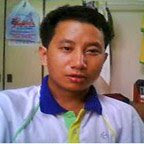
On March 8, 2006, I came to
I heard some of my friends who went to
Rev. Fr John, a New Zealander Marist missionary who arranged everything for my study in Thailand, had already mentioned in his early mail where to find Ronald, a Filipino Marist lay who works with the Marist mission in Ranong. He would wait for me somewhere in the waiting area. He instructed me to turn left and I would easily spot Ronald in the airport.
I met three Shan girls from my country who did not know how to fill the entrance registration at the counter. Irrevocably, I went to them and offered my assistance. They spoke Thais and Burmese but they did not seem to know how to write Burmese nor English. I was surprised. I was like a hero for them at the moment. It took 20 minutes.
Then, I lined up for my turn at the counter. The officers were checking my passport carefully and I wonder they seemed to check it word by word. It took for minutes. I noticed in other counters, the officers let other foreigners pass quickly but mine was different. I did not know why. Strange!
Finally, one of the custom officers signaled me to stand in front of the camera and they took a picture. I understood that it was a special treatment for a Burmese citizen.
Oh gosh! I realized that I forgot to claim my luggage. I was almost in the waiting area. I was overwhelmed and worried because I put all my money in the luggage. In a hurry, I turned back and I heard a staff shouting and waving her hands to go back. I did not mind her. I did not know where to get my luggage. I saw a lady carrying her luggage near the elevator and I asked her where she got it. With a big smile she pointed at the place where I saw my big red luggage.
Now, I could at least relieve and relax to get my luggage but I totally forgot to turn left. So, I came to the waiting area where people were holding postcards and shouting names, and I looked for Ronald who would be there. I did not know that I was in the wrong area. Again, I was deeply disappointed. I kept on looking for him. Instead I saw one of the girl I helped at the counter and she was busy with calling. I was happy to see her at least. I asked her to use her cell phone. Or else, I had no idea how to find Ronald.
Ronald sounded to surprisingly answer me and he asked me to go outside from the place where I was in the moment. Of course, I was very happy to see him. I tried not to think about my accidents inside the airport. I noticed he looked quite frustrated. Of course, I could understand because I had let him wait for almost an hour.
When I got into a taxi, I was amazed to see the giant buildings, artistically carved roads and bridges in the city, the underground and sky trains, countless cabs and buses, and private small and big vehicles. I was shocked and speechless to see these things. I just shut up my mouth and gazed at those strange and new things.
Ronald brought me to the restaurant. He gave me some money to buy food for my own. At first, I did not know why he let me buy food for myself. Honestly, I was quite upset because I did not know what to buy. The foods were also different. Later, I found out that he showed his respect for my own choice. I understood that I was no longer in
Then we proceeded to the southern bus terminal to go to Ranong where Fr. John would be waiting for me. Ronald had already bought the tickets for me too. It was a nine-hour trip and I found the bus was so nice and luxurious that I fell asleep. We arrived to Ranong in the next early morning.
Fr. Joel and Bro Gil were still in their beds at that time. But when we arrived, they woke up. I was so happy to see the two Filipino Marist missionaries because I met them in




